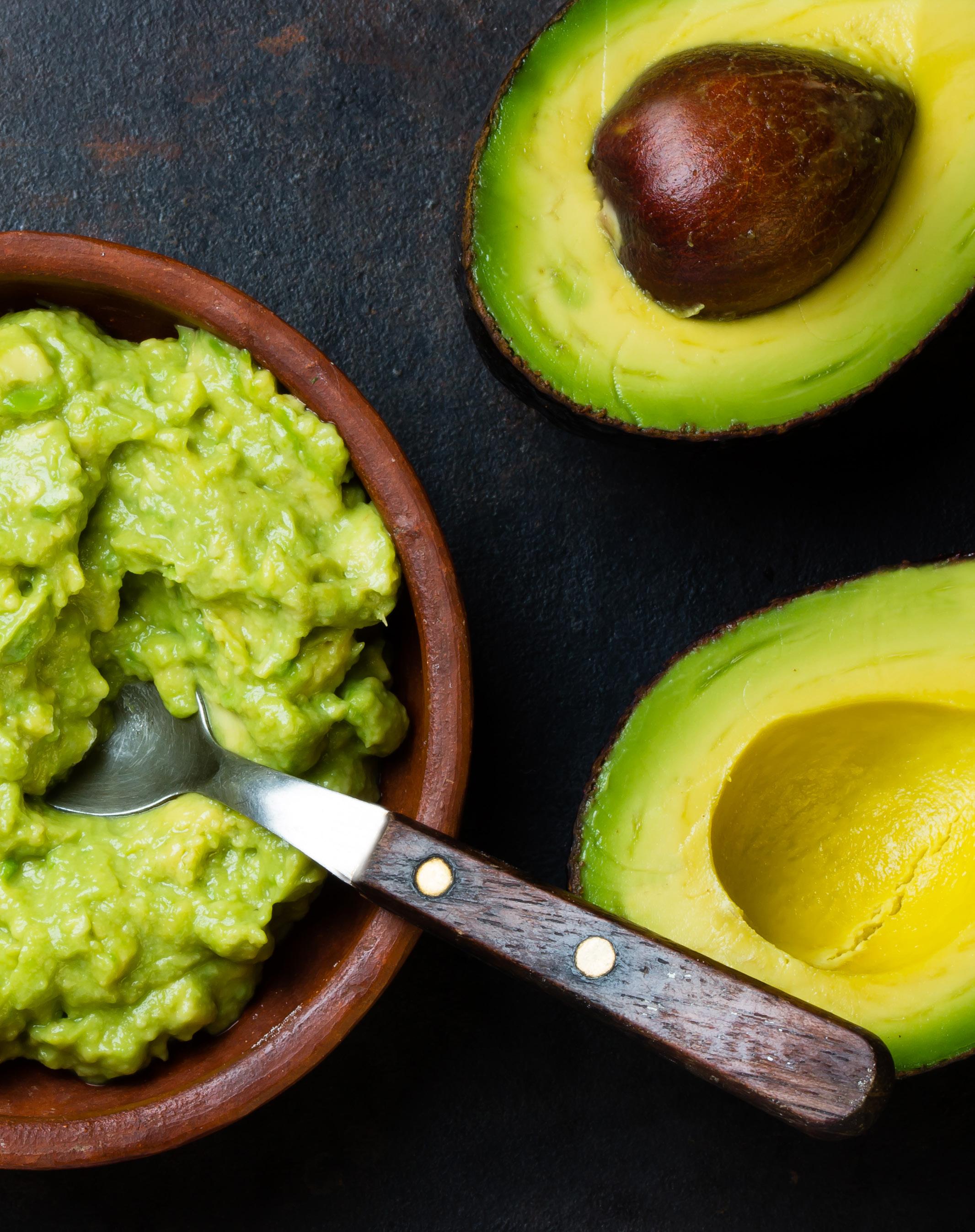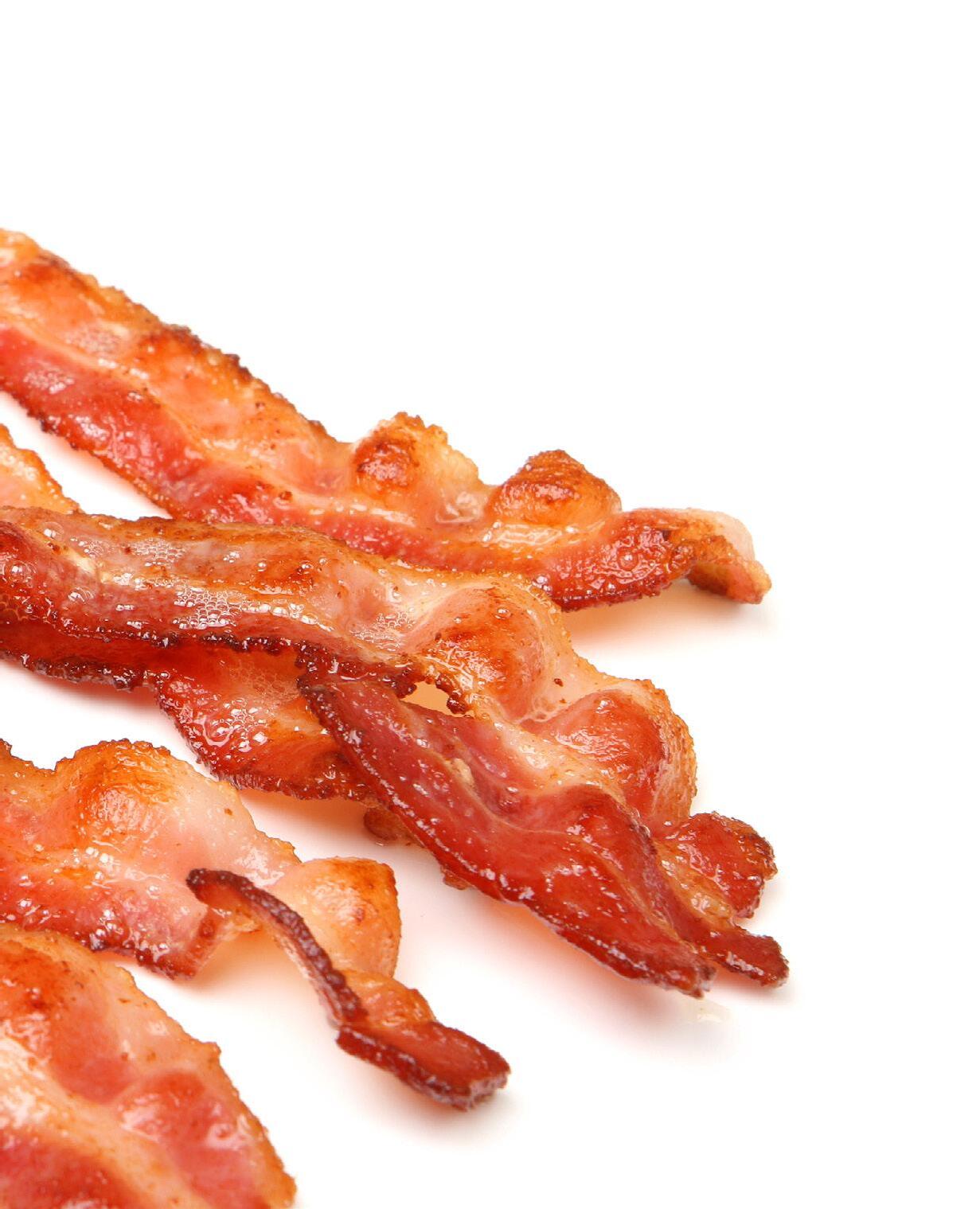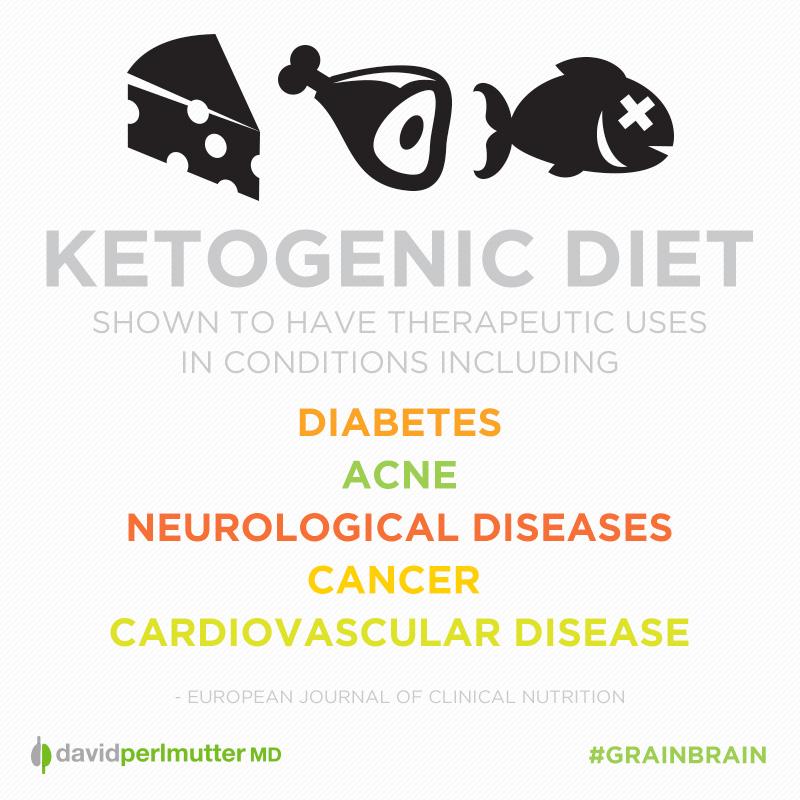FOCUS ON: KETOGENIC DIET
DAVID PERLMUTTER, MD

From The Desk of Dr. Perlmutter




From The Desk of Dr. Perlmutter


Likely, you’ve been reading more and more about the ketogenic diet in the past few months, and for good reason. Practicing this approach to eating can reap myriad health benefits. But what is it exactly?
Our bodies are said to enter ketosis at the point when blood sugar levels are low and liver glycogen is no longer available to produce glucose as a fuel for cellular energy production. At this point, not only is the body doing the natural thing, and burning off fat, it’s also powering up the brain with a super efficient fuel. Importantly, the ketogenic diet has scientifically-proven efficacy as a treatment for Alzheimer’s, epilepsy, depression, migraines, and many other illnesses that plague huge portions of our population.
When you’ve finished reading, do visit my website to learn and discover even more. I’ll continue to scour medical journals for the latest research, and help you understand what that means for your health.
In good health,

Epilepsy can be caused by a variety of different conditions including head trauma, infection, brain tumor, and stroke, but by and large most cases of epilepsy have no readily identifiable cause. Epilepsy affects some 2.3 million adults in America and close to half a million children. Further, about one in 26 people will be diagnosed with epilepsy at some point in their lives. It’s been estimated that there are approximately 150,000 new cases of epilepsy diagnosed in the United States each year and overall about $15.5 billion in medical costs as well as lost earnings and production are attributed to this disease.
The mainstay of treatment for epilepsy is pharmaceutical intervention. As I have noted, more and more we are seeing surgical procedures being performed for those individuals who have not had a significant improvement with drugs. I indicated that at least some individuals are gluten sensitive and may benefit from a gluten-free diet which potentially could keep them from undergoing potentially lifethreatening surgery as a treatment for their epilepsy.
But it is also important to understand that there’s another extremely effective dietary intervention that has proven itself quite useful in the treatment of epilepsy.
In 1920 a New York physician, Dr. Galen, reported at the American Medical Association convention that he had had
significant success in treating epilepsy by initiating a program of fasting. At that time the only pharmaceutical interventions that were available included phenobarbital and bromides. Interestingly, the patient he treated was actually a young cousin who had aggressive seizures. On the second day of fasting the child’s epilepsy abated and did not return over the next two years of follow-up. Further studies appearing in 1923, 1926, 1928, all confirmed the effectiveness of fasting as an effective treatment for seizures.
Fasting is a way to produce a state of metabolism called ketosis. When a person is in ketosis, his or her body is utilizing fat as opposed to carbohydrate as a fuel, which, in this situation, becomes an alternative source of calories to power the brain.
To this day, a ketogenic diet, meaning a diet that is designed to increase the availability of fat while decreasing the availability of carbohydrate, remains an important tool that can be utilized in the treatment of children with epilepsy who do not have full response to medication.
Now, a report in the journal Neurology reveals that, in fact, a ketogenic diet is also profoundly helpful in adults as well in terms of treating epilepsy. This research, published by investigators in Maryland, found that there was at least a 50% reduction in seizures in 32% of patients treated with a ketogenic diet as well as in
29% of patients who went on a modified Atkins diet. In fact, 9% of those placed on the ketogenic diet and 5% of those placed on the modified Atkins diet had a greater than 90% reduction in the frequency of their epileptic seizures. These diets were designed such that the bulk of calories, between 67% and 75%, came from fat. The study revealed that “the anticonvulsant effect occurs quickly with both diets, within days to weeks.” Interestingly, the most common side effect was weight-loss which the office indicated “maybe advantageous inpatients with obesity.”
Further, the authors revealed that only 60 to 65% of patients with epilepsy become seizure free using medication while 35% are resistant to the effects of medication. And they used these statistics to justify this study. They further stated that there has been an “exponential” growth in interest in using the ketogenic diet for the treatment of epilepsy.
The take-home message here is that patients with epilepsy have options beyond simple pharmaceutical intervention, and these include dietary changes which well-respected science is now validating as having significant efficacy. A fundamental cornerstone of the Grain Brain Program is profound reduction of carbohydrates and sugars while increasing “good” dietary fats. This approach tends to favor a low grade of ketosis which may well be the normal state of human metabolism. I have written extensively both on the site and in Grain Brain how this dietary approach has profound health-related benefits that


relate to weight loss, metabolism, energy, reduction of inflammation, and even reduce risk for diabetes and cancer. This report offers up yet another benefit to a higher fat, lower carbohydrate dietary approach, in this case, for a disease that is devastating for so many.
In closing, I want to share with you a personal story of success I have had in my own practice.
Michelle is a 33-year-old woman who began having seizures at age 6 years. Over the years she was placed on multiple medications none of which was successful either individually or in combination. At the time of her initial evaluation, in June 2014 she was experiencing seizures approximately every six to eight weeks, lasting approximately 3 minutes.
We placed Michelle on a glutenfree, ketogenic diet and for the first time she has become seizure free.
When I was six years old, I was diagnosed with temporal lobe, partial-complex epilepsy. Over the years, I have seen multiple doctors and neurologists and I have been on every medication created to treat epilepsy, but I still continued to have seizures about every 6-8 weeks. For the most part, I have been able to lead a normal life achieving my college degree, getting
married and having two happy, healthy kids but every time I had a seizure it was a cruel reminder that I was not everything I needed to be for my family. Many times after a seizure, I would be unable to work and care for them for days at a time.
I had been working with Dr. Donna Andrews and was able to understand that my seizures had to do with a lot more than the former doctors had explained to me. I was learning about how my blood sugar and stress levels affected my health and had experienced multiple stretches of three months without seizures but it was never consistent. Even though I knew I was headed in a better direction, I didn’t believe I could really be well.
After reading Grain Brain by Dr. Perlmutter, I called his office and was able to meet with him in person. When he read my past medical history he confidently prescribed the Ketogenic diet for me and his nutritionist worked to
develop just the right set-up for my BMI. It seemed like a big change at first but really it has been much easier than I originally thought it would be. Now, after being on the diet, along with probiotics and supplements, I can say that I have been seizure free for over 4 months for the first time in over 20 years! My whole world is changing! I can work on getting my driver’s license! I can be what my family needs me to be! I believe God has used the Ketogenic diet to heal my epilepsy and I want to make sure everyone out there who is suffering from seizures has the opportunity to know about and try this amazing, risk-free treatment!

Amyotrophic lateral sclerosis (ALS) also known as Lou Gehrig’s disease, is a challenging progressive neurological disorder for which there is currently no meaningful treatment. As many as 30,000 Americans may suffer from ALS and the life expectancy from the time of diagnosis averages from two to five years.
The disease causes progressive wasting of muscles and leads to difficulties in speech, swallowing, mobility and even respiration. Cognitive function is typically spared.
The cause of ALS remains unknown, but what is clear is that for some unknown reason, there is a progressive failure of energy production of the motor neurons, the nerve cells that connect the brain to the muscles.
It is known that a diet that converts metabolism to a ketogenic state, meaning
burning fat not carbohydrates, is effective in protecting nerve cells and preserving their ability to make energy. With that in mind, ALS researchers explored the effectiveness of a ketogenic, high fat diet, in the treatment of the mouse model of ALS and demonstrated some pretty remarkable results. This remarkable report from researchers at Mount Sinai School of Medicine in New York was the first to show a substantial benefit in the treatment of ALS in the animal model using a ketogenic diet.
As a practicing neurologist dealing with ALS on an almost daily basis I feel it is important to share this information. This is why I have incorporated a ketogenic diet in the list of recommendations I make to patients who are looking for any possible leads that may help with this condition.
When talking about a Grain Brain lifestyle, and the very similar ketogenic diet, it’s frequently mentioned that we are aiming to keep our bodies in ketosis. However, if you’re new to my work, it may be that you’re not exactly sure what ketosis is, or why we should be worrying about getting our body into this state. Allow me to explain.
Ketones are a special type of fat that can stimulate the pathways that enhance the growth of new neural networks in the brain. A ketogenic diet is one that is high in fats, and this diet has been a tool of researchers for years, used notably in a 2005 study on Parkinson’s patients finding an improvement in symptoms after just 28 days. The improvements were on par with those made possible via medication and brain surgery. Other research has shown the ketogenic diet to be remarkably effective in treating some forms of epilepsy, and even brain tumors
Ketones do more than just that though. They increase glutathione, a powerful, brain-protective antioxidant. Ketones facilitate the production of mitochondria, one of the most important actors in the coordinated production that is the human body. And that’s just the tip of the iceberg.
Our bodies are said to enter ketosis at the point when blood sugar levels are low and liver
glycogen are no longer available to produce glucose as a fuel for cellular energy production. At this point, not only is the body doing the natural thing, and burning off fat, it’s also powering up the brain with a super efficient fuel.
We can jump start ourselves into ketosis with a brief fast, allowing our body to quickly burn through the carbs that are in our system, and turn to fat for fuel.
A ketogenic diet is one that derives around 80% or more of of its calories from fat, and the rest from carbs and proteins. Please refer to our focus section on ketosis for much more information about this very important topic.

If you’re a part of our community on Facebook, you may remember seeing a study I posted regarding the long-term impacts of the ketogenic diet in a study of obese patients. The study, available thanks to the US National Library of Medicine and the NIH, had some very interesting findings on the impact of diet on brain and body health, and my post on the subject saw a lot of traction. Because of that, and because the findings have such importance, I wanted to share the research with you here. The study shows that the ketogenic diet has efficacy as a treatment for Alzheimer’s, epilepsy, depression, migraines, and many other illnesses that plague huge portions of our population. I encourage you to read this study and to learn more.




One of the myths I’m always trying to dispel is that fat is unhealthy. Most people think those high-fat foods are the reason their pants are fitting a little tighter. They’re not far off, the diet of the average American does contain a lot of unhealthy, high-fat foods, but also a lot of carbohydrates. In this type of diet, the body breaks down the glucose found in carbs and stores the fat from these fatty foods. However, the ketogenic diet, which eliminates nearly all carbohydrates, champions the consumption of “healthful” fats, and rightly so.
This article, from Better Nutrition Magazine, identifies those fats that you should make sure to incorporate into your diet. Some tips:
• Skip inflammatory oils like canola or corn oil. Instead, reach for alternatives like coconut or extra virgin olive oil
• Incorporate only grass-fed meats into your diet
• Occasional fruit consumption is a-ok. Reach for apples or berries.
• To get more omega-3s in your diet, reach for supplements like DHA, ALA or fish oil.


You probably know we’ve had a lot of discussion on The Empowering Neurologist, my interview series, talking about the ketogenic diet, a diet that powers the body with fat as opposed to carbohydrates. And we have certainly covered the brainboosting benefits of being in ketosis as well, and a lot of people have asked where is the science? Are there any clinical studies that actually show improvement in a particular neurological problem when people are placed on ketogenic diet? As a matter of fact those studies are few and far between. But there was one study done many years ago that actually instituted a very ketogenic diet in five patients who were suffering from Parkinson’s disease, and noted some very significant changes.
So let’s take a look at the study. Right off the bat the notion of treating Parkinson’s disease with any diet is certainly exciting, in
this case by increasing ketones. We know that there is a defect in the way brain cells make energy in Parkinson’s and ketones are able to bypass that defect.
A dietitian following the five patients determined whether they were adherent to the diet or not, and also evaluated their serum ketone levels. Additionally, they underwent what’s called the UPDRS study. That is the unified Parkinson’s disease rating scale that looks at mentation and mood, activities of daily living, motor function, and treatment complications from medications, and comes up with a a total.
Looking at the results, in these five patients there is a dramatic improvement brought on by the ketogenic diet. In motor function before and after going into ketosis there is, across the board, some pretty dramatic improvements and lowering of scores on
the UPDRS, meaning improvement. When you look at the percentage decrease in the UPDRS demonstrating better functionality in living, there are some pretty profound findings in terms of what this ketogenic diet was able to do, really across the board. And these results are markedly better than anything pharmaceutical that’s available right now.
I really am hopeful that more researchers will want to try using a ketogenic diet in neurological problems. We understand why ketones are so beneficial for the brain and hope to see more of this research. In the meanwhile I think we have to continue to understand what the basic science and the animal research is telling us and try to leverage that information in terms of recommendations for all of us and our health.
Click here to watch full video

DP You were given ranges of your hemoglobin A1C which now you realize were way too high to be healthy, and you endeavored to get your blood sugar down by engaging in exercise. That didn’t seem to be very effective. What happened with that?
KR When you hear in the media about the effect of exercise on diabetes, what you’re really hearing is the effect of exercise on Type 2 diabetes. Exercise is very effective in improving insulin resistance, so it is very good for that. In Type 1, exercise actually makes Type 1 diabetes more difficult to control. Exercise, particularly intense exercise, causes a release of stress hormones like cortisol, epinephrine, or lupigon. There is a good purpose for those hormones, it’s just to provide nutrients to exercising muscle. But if you can’t secrete insulin, which is what happens in Type 1, then you have no way to compensate for the release of those other hormones.
KR Type 1 diabetes is an autoimmune disease, and the actual triggers for that autoimmune process — there’s debate about it and it’s not quite known what those true triggers are. But there’s usually something within the environment, whether it’s an infection or some dietary component. Gluten has been one of the suspects that may trigger the autoimmune process in T1 diabetes. The body recognizes these triggers foreign and then mounts a response against it, and then accidentally, so to speak, the target for this immune attack is insulin itself, or the beta cells in the pancreas that make the insulin. The beta cells, over time, become destroyed, and when you get down to a quarter of your remaining beta cells, that’s when you have high blood sugar and diabetes.

DP What can we say to the common man, then, in terms of the notion of engaging ketosis as being good for the brain?
DD There’s emerging data to indicate that a state of ketosis is beneficial to the brain, not just because ketones are an energy metabolite that have superior bioenergetic effects as far as making APT, but they have signaling properties that are independent of their role as an energy metabolite, and that can have epigenetic effects and activate genetic programs that, for example, enhance antioxidant systems.
DD One of the studies that we did at Yale University was that it suppressed inflammation through suppressing the NLR P3 inflammazome. And that inflammazome is tightly linked to many agerelated chronic diseases and autoimmune diseases. It’s suppressing that inflammazome independent of its effect on metabolism.
DDA Ten years ago, we did not even understand that these energy metabolites had effects independent from energy. But it makes sense that you would want to have epigenetic regulation or suppression of inflammation.

DP What is it about fasting that is so good for the body, that you want to make a diet that mimics that? Why do people advocate fasting in the first place?
VL There are a number of reasons. The main one we described at my laboratory is the clearance of damaged cells and damaged components of cells. On one side, white blood cells can be destroyed. This sounds like a negative thing, but there are a number of examples that have shown why this can be effective in clearing out your overzealous immune-system cells attacking the myelin in the spinal cord. For multiple sclerosis for example, this was great work.
VL I’m not arguing against [exercise], I’m just saying that we have to be careful what the mechanisms are. We know the glycogen can be around for at least 10-12 hours, and the ketone bodies in most cases, we don’t see them going out for at least a couple days. So it means that to mimic this process, the brain will switch into a ketone-body dependent mode.
DP You made an interesting comment that suggests we are essentially emulating the caloric resources of our ancestors. We did experience times of caloric scarcity, in which these pathways should’ve been activated — the survival pathways, if you will.

> A Ketogenic Diet Extends Longevity and Healthspan in Adult Mice. Cell Metabolism, 2017 [LINK]
> An Evolutionary and Mechanistic Perspective on Dietary Carbohydrate Restriction in Cancer Prevention. Journal of Evolution and Health, 2016 [LINK]
> Caffeine intake increases plasma ketones: an acute metabolic study in humans. Canadian Journal of Physiology and Pharmacology, 2016 [LINK]
> Ketone bodies as signaling metabolites. Trends in Endocrinology and Metabolism, 2014 [LINK]
> Ketone body β-hydroxybutyrate blocks the NLRP3 inflammasome-mediated inflammatory disease. Natural Medicine, 2015 [LINK]
> Dietary treatment in adults with refractory epilepsy. Neurology, 2014 [LINK]
> Is there a role for carbohydrate restriction in the treatment and prevention of cancer? Journal of Nutrition and Metabolism, 2011 [LINK]
> Ketone bodies as a therapeutic for Alzheimer’s disease. The Journal of the American Society for Experimental NeuroTherapeutics, 2008 [LINK]
> Schizophrenia, gluten, and low-carbohydrate, ketogenic diets: a case report and review of the literature. Nutrition and Metabolism, 2009 [LINK]
> Low-glycemic-index treatment: A liberalized ketogenic diet for treatment of intractable epilepsy. Neurology, 2005 [LINK]
> Efficacy of the Atkins diet as therapy for intractable epilepsy. Neurology, 2003 [LINK]
> Metabolic management of glioblastoma multiforme using standard therapy together with a restricted ketogenic diet: Case Report. Nutrition & Metabolism, 2010 [LINK]
> A ketogenic diet as a potential novel therapeutic intervention in amyotrophic lateral sclerosis. BMC Neuroscience, 2006 [LINK]
> Autism and Dietary Therapy Case Report and Review of the Literature. Sage Publications, 2013 [LINK]
> Ketoacids? Good medicine? Transactions Of The American Clinical And Climatological Association, 2003 [LINK]
> Neuroprotective and disease-modifying effects of the ketogenic diet. National Institute of Health, 2006 [LINK]

It’s time to turn advice into action. The Grain Brain Whole Life Plan is your practical, comprehensive empowerment guide for achieving optimal health, preserving brain vitality, losing weight and reducing your risk for chronic diseases. Dr. Perlmutter leverages the leading edge of published science on nutrition and wellness, taking the lessons of Grain Brain and Brain Maker to create a powerfully actionable plan for optimizing health and achieving peak mental performance. The Grain Brain Whole Life Plan – live happily ever after.


Twitter.com/DavidPerlmutter


